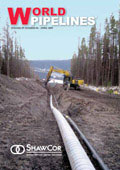Editorial comment
What’s the outlook? The oil and gas industry is suffering from a double blow at the moment: severe economic slowdown, which, in turn, has led to a sharp drop in the price of crude and natural gas.
Register for free »
Get started now for absolutely FREE, no credit card required.
What’s the outlook? The oil and gas industry is suffering from a double blow at the moment: severe economic slowdown, which, in turn, has led to a sharp drop in the price of crude and natural gas. This one-two punch spells a period of uncertainty for the industry, which must think of ways to cope with the slump whilst trying to retain its skilled worker base for the future.
Last month, unemployment in the USA climbed to 8.1%, the highest it has been in a quarter of a century. Workers are suffering from a general caution on the part of companies to invest funds in new projects and infrastructure. In the US especially, the ease of hiring and firing within the oilfield and oilfield service industries means that many pipeliner jobs will be at risk this year.
As pipeline companies have no control over demand, borrowing rates, or price per barrel, this leaves project and labour costs as the areas in which they can save money. Hiring freezes are being seen, projects are being postponed and in some cases cancelled and, unfortunately, companies are having to cut staff: pipeline service companies cutting personnel include FMC Technologies, Schlumberger, Halliburton, and Baker Hughes.
In the past, layoffs would have been an early resort when times where tough, but employers will want to avoid the mistakes made in the past – laying off staff and then lacking skilled workers when the market improves. Engineers, geologists and skilled operators were all severely lacking following the mass layoffs in the 1980s and 90s, when a glut of oil drove prices way down. In the wake of such hard times, in the boom that comes after the bust, the industry will need talent. A ‘lost generation’ of oil workers still has its impact on today’s industry and employers would do well to heed this mistake and continue efforts to hire and hold skilled staff.
Speaking last month, David Doig, CEO of OPITO, said that the next 12 to 18 months would be “a period of rationalisation and consolidation” for the industry. Just as consumers are feeling the pinch, so too are energy companies.
While we wait for fiscal rescue measures to succeed, and for government-sponsored energy programmes to pay out, and for key upcoming pipeline projects to create new jobs, there is some positive news. Despite plummeting energy prices and profits, companies do recognise that it is essential to continue hiring and training and incentivising talent within the industry. In an interesting story from the US, ConocoPhillips, Chevron Corp. and BP are all encouraging employees to use modern media such as handheld computers, interactive Web pages, blogs and social networking to record information on how they make crucial workplace decisions, or how they approach and resolve problems at the office and in the field. In this way, they are able to pass on their expertise to new generation staffers, helping to solve one of the industry’s biggest challenges to date: the retirement of half of the workforce over the next ten years. Such schemes are expected to save training costs and bridge the gap between new employees and older generations, keeping the influx of new employees constant.
In other encouraging news, it seems the energy industry is experiencing a popularity boost. A recent US college senior student survey showed that energy is one of the Top 5 fields of interest for graduate employment. A few years ago, energy typically didn’t make the Top 20 list in similar surveys, so this is an exciting development.
It is prudent to put in place measures to cope with credit crunching economics, but those working in the oil and gas industry are well-versed in the boom and bust cycle, and so should be putting considerable efforts into retaining and gaining valuable staff, keeping one eye on the horizon, where we know we will see better days.


